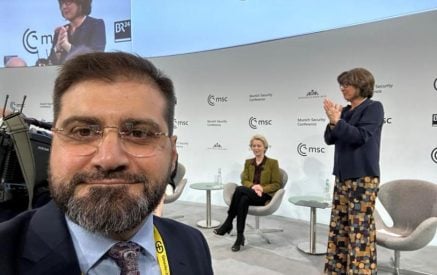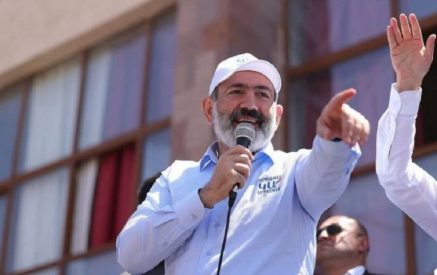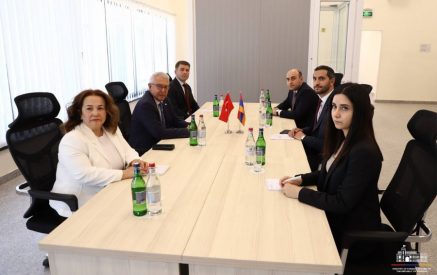The Armenian Mirror-Spectator. TORONTO – The world recently witnessed how the Turkish state “reconquered” the 1500-year-old Byzantine holy church of Hagia Sophia in Istanbul, by converting it from museum to mosque. The chief Turkish Islamic cleric held a long sword in his hand during the first opening prayers of Quran, symbolizing the power of the conqueror and signifying that anything conquered by sword belongs to the conqueror – all churches, buildings, possessions, women and children of the conquered people. If the conqueror allows a few of the conquered people to live, they are called the “Remnants of the Sword,” as I had explained in a previous article. None of the invited foreign dignitaries, more significantly, none of the Islamic country dignitaries attended the opening prayers. Yet, masses of Turkish people rushed to the church/museum/mosque, chanting Allah-u akbar in the streets, on buses or subway trains, as if they are literally conquering the church from the Christian enemy right now.
The Turkish state has always relied on manipulating the masses against a real or imagined enemy, based on nationalism in the past and now, combining it with religious fanaticism, creating a Turco-Islamic fascist racist society.
In the eastern provinces of Turkey, the real or imagined enemy has always been the Armenians, and even one hundred years after wiping out the Armenian population in eastern Turkey (Western Armenia), the hatred toward Armenians is kept alive by annual celebrations, organized by the central and local governments, of ‘liberating’ every town or village from the dreaded Armenians.
These liberation celebrations have nothing to do with the 1915 Armenian Genocide operations, but rather, they are about the complicated events that took place in eastern Turkey/ Western Armenia during 1915-1920. In 1915-17, the Russian army advanced into eastern Turkey already emptied of its Armenian population, occupying many provinces including Van, Erzurum, Erzincan, Bitlis, Mush, Sivas. But with the 1917 Russian Revolution, the Russian military operations ceased and Russian soldiers started returning home, leaving the defense of the front and the vast occupied territories to a few Armenian detachments, headed by General Antranig Ozanian, assisted by Mourad and Torkom.
Read also
The occupied territories were administrated by the Transcaucasian Comissariat with Armenian, Georgian and Azerbaijani officials, with its capital in Erzurum. It was almost impossible to govern, resulting in complete chaos and confusion. Although the war ended in 1918, the Turkish armies were not disbanded and they started advancing eastward, liberating town after town while General Antranig, severely outnumbered, retreated in an orderly way, thereby providing safe passage to Armenia for several thousand Armenian civilians still alive in these towns. Turks took back Erzurum unopposed in March 1918 and continued marching eastward taking other towns until May 1918. The Armenians the defeated them at Sardarabad, securing the foundation for the new Republic of Armenia on May 28, 1918. Unfortunately, the Turks started attacking Armenia again in 1920, taking more territories until Armenia became a Soviet republic in November 1920.
The liberation of Erzurum and all other towns in eastern Turkey are celebrated every year, with mandatory attendance by all schoolchildren, the parents, various officials and army commanders. In addition to fiery speeches, a theatrical performance is prepared by the government in every town, showing the Armenian occupying forces and the victory of the Turks over the Armenians. The Armenian soldiers and officers are invariably depicted wearing black uniforms with a white cross sewn on their back; they give each other Nazi-style salutes. The commanding Armenian officer is named Arshak Pasha; his sidekick assistant Kirkor brings the local Islamic cleric and young rebellious Turks to Arshak Pasha who beats and executes them, until the “heroic” Turkish soldiers rush to the sound of guns and artillery, murdering or chasing the Armenians out of town.
In past years, the local municipality sanitation workers were ordered to play the role of Armenians, but after several of them were severely beaten up by excited local townsfolk as “traitors,” they refused to participate. Then the local governments started advertising to pay anyone who would be willing to play the role of Armenian soldiers. When no one volunteered fully aware that they will be rewarded with a beating, the pay was doubled and tripled. For the past few years, real actors have been hired to participate in these liberation events, with strict orders by the police to the audience not to beat up the actors playing the Armenian traitors at the end of the performances.
I have attached two videos showing these annual “liberation” celebrations, from Erzurum (Garin) and Bayburt (Papert). No translation is necessary; just watch how Armenians are shown to be cruel, sadistic and despicable, while the Turks are innocent victims or heroic martyrs. Suffice it to say, these performances help brainwash generation after generation of Turks to hate the Armenians.
By Raffi Bedrosyan





















































